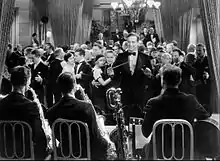| Crooner | |
|---|---|
 Teddy Taylor (David Manners) conducts his band | |
| Directed by | Lloyd Bacon |
| Screenplay by | Charles Kenyon |
| Story by | based on a story by Rian James |
| Produced by | Lucien Hubbard |
| Starring | David Manners Ann Dvorak |
| Cinematography | Robert Kurrle |
| Edited by | Howard Bretherton |
| Music by | Vitaphone Orchestra conducted by Leo F. Forbstein |
Production company | |
| Distributed by | First National Pictures |
Release date |
|
Running time | 67 minutes |
| Country | United States |
| Language | English |
Crooner is a 1932 American pre-Code musical drama film directed by Lloyd Bacon and starring David Manners along with Ann Dvorak and Ken Murray. It concerns the abrupt rise and fall of a popular crooner, Teddy Taylor.[1]
A print is held by the Library of Congress.[2]
Plot
Teddy Taylor is the leader of Ted Taylor's Collegians. One night, his usual singer can't sing. He decides to try out singing. However, his voice can't be heard over the band. A dancer stops and jokes with him by handing him a megaphone. Taylor sings through it, and he is heard. The ladies are enamored with his soft voice while the men are disgusted. Taylor becomes a big star over night, but his ego becomes inflated. Things come to a head when Taylor loses his temper and punches a heckler in the audience, who he didn't realize was a cripple. Shunned, he loses his girlfriend, his band, his fame, and his dignity.
In the final scene, as a drunk and unhappy Peter Sturgis, who promoted Teddy Taylor into a singing star and gave up his fiancée Judy Mason to him, continues to drink heavily in a speakeasy, an announcer on the speakeasy's radio proclaims, "…And now, it is our great privilege to bring to you the new sensation of the air, Bang Busby, who will croon for you in his inimitable manner, 'Sweethearts Forever'". As the song, which had already been sung a number of times by Teddy Taylor, begins to be heard, Sturgis grabs a bottle and hurls it at the radio, breaking it.
Cast
|
|
Production
Brick Holton provided Ted Taylor's singing voice.[3] Rudy Vallée was originally considered for the role of Taylor, but contracts prevented this.[4][5]
Reception
"It hands a loud but quite amusing razz to all such radio performers," wrote a critic for Photoplay. "Ken Murray and Ann Dvorak help to make this bright and entertaining."[6]
Soundtrack
- Music by Jack Little and John Siras
- Lyrics by Joe Young
- "Sweethearts Forever"
- Music by Cliff Friend
- Lyrics by Irving Caesar
- "Three's a Crowd"
- Music by Harry Warren
- Lyrics by Al Dubin and Irving Kahal
- "I Send My Love With These Roses"
- Music by Joe Burke
- Lyrics by Benny Davis
- "You're Just a Beautiful Melody of Love"
- Music by Bing Crosby and Babe Goldberg
External links
References
- ↑ The AFI Catalog of Feature Films 1893-1993:Crooner
- ↑ Catalog of Holdings The American Film Institute Collection and The United Artists Collection at The Library of Congress, (<-book title) page 37 c.1978 by The American Film Institute
- ↑ Bradley, Edwin M. The First Hollywood Musicals: A Critical Filmography of 171 Features, 1927 through 1932 McFarland, 1996, p. 311.
- ↑ "Hot Off the Ether!". Screenland. New York: Screenland Magazine, Inc. September 1932. Retrieved February 21, 2016.
- ↑ "Men of the Mike". Silver Screen. New York: Screenland Magazine, Inc. June 1932. Retrieved February 22, 2016.
- ↑ "The Shadow Stage". Photoplay. New York: Photoplay Publishing Co. October 1932. Retrieved February 21, 2016.